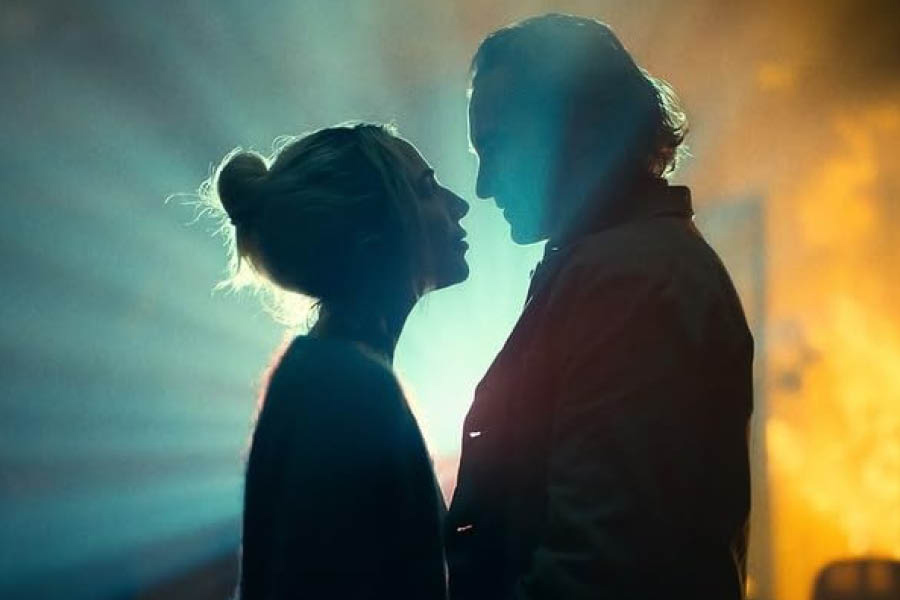Todd Phillips’ Joker: Folie à Deux is a daring and unconventional sequel to Joker (2019) that goes deeper into the mindscape of Arthur Fleck — the man who would become Joker — but uses the format of a musical to paint a picture of his delusional world. The songs are an extension of Arthur’s deteriorating psyche. We pick some of the memorable musical moments from the film.
Looney Tunes
The film begins with an animated Looney Tunes sequence — like the ones we have grown up watching on Cartoon Network — invoking a sense of childlike whimsy. The Joker walks the red carpet to attend the premiere of his show amidst a crowd of paparazzi and fans. But the scene quickly morphs into something darker. Joker’s shadow breaks free and holds him captive inside the green room to appear as the hero of the show. Little do we realise this sequence is in fact a metaphor for the entire film.
Frank Sinatra’s Get Happy
At the heart of this story is Arthur Fleck’s (Joaquin Phoenix) relationship with Lee (Lady Gaga), a fellow inmate at Arkham State Hospital. When Arthur first meets Lee, she’s singing with the hospital choir. It’s love at first sight. Few days later when Arthur is also enlisted into the choir for therapy, Lee walks up to him and sings Frank Sinatra’s Get Happy: ‘Forget your troubles and just get happy... You better chase all your cares away’.
After this encounter, Arthur, who had retreated into his shell all this while, tells his first joke in months to a cop.
Stevie Wonder’s For Once In My Life
When he gets the news that the DA’s office would be seeking the death penalty for him, Arthur’s first reaction is to break into Stevie Wonder’s For Once In My Life with fellow inmates. He has just seen Lee for the first time and found a new zeal for life. He now dreams of making a mountain after being freed from Arkham, with Lee as his companion.
Lady Gaga’s Folie à Deux
As their relationship intensifies, Arthur skips his medication, slipping into a hallucinatory realm that resembles a dark and twisted version of a classic musical. During a movie screening at Arkham, Lee sets the asylum on fire and they try to escape. ‘I know where we're going. And it's a heaven, An island for when we'll both settle in, a paradise,’ Lee sings to Arthur, who starts believing that this fantasy world is real.
Ella Fitzgerald’s Bewitched, Bothered, Bewildered
During a television interview before the trial, the reporter accuses Arthur of faking mental instability while he is, in reality, a cold-blooded murderer. Arthur snaps back and breaks down that nobody has ever understood him. He announces that he is in love with Lee, who is the only person in the world who cares about the ‘real’ him. ‘I'm wild again, beguiled again. A simpering, whimpering child again. Bewitched, bothered, and bewildered,’ Arthur sings.
Shirley Bassey’s There’s Always a Joker in the Pack
A turning point in Arthur’s trial comes when he fires his lawyer and embraces his ‘real’ personality — that of Joker —- which Lee has been instrumental in shaping. But not before a musical performance of Shirley Bassey’s There’s Always a Joker in the Pack for those present in the courtroom, voicing his angst: ‘everyone laughs at him, just the same/They don't see his lonely heart break’.
Louis Armstrong’s When the Saints Go Marching In
After resting his defence in court, Arthur/Joker returns to Arkham like a victor. His body language has transformed. He is no longer the droopy, old man tired of life. He gets a hero’s welcome from other inmates who break into a rebellion against the Arkham authorities. Louis Armstrong’s When the Saints Go Marching In is their song of resistance. As anarchy grips Arkham, Arthur breaks into a maniacal laughter seeing people rising up against the establishment.
Jack Buchanan’s That’s Entertainment
Arthur’s fantasy world comes crashing down when an inmate is killed in a scuffle, forcing him to realise he’s no hero. He denounces his Joker persona before the court verdict, losing the crowd’s support, including Lee’s.
In their final meeting, Lee leaves him for abandoning their shared illusion, and as she begins to sing That’s Entertainment, Arthur begs her to stop, showing that he no longer wishes to live in their delusion but face reality instead.









